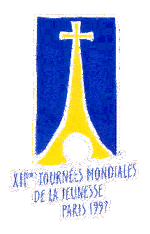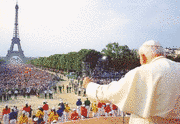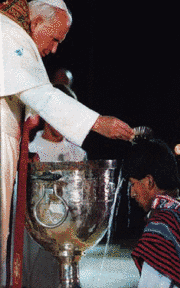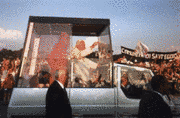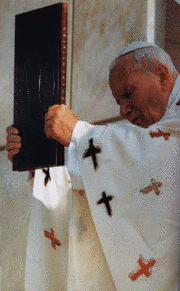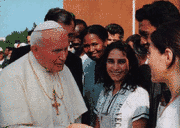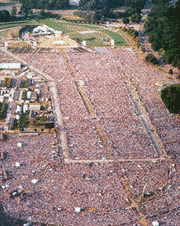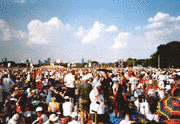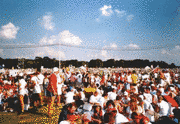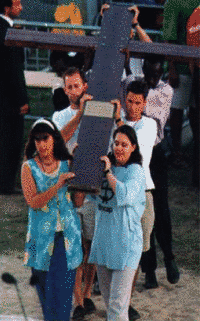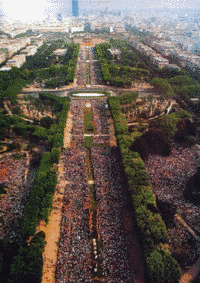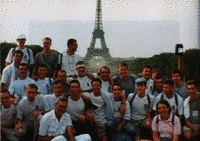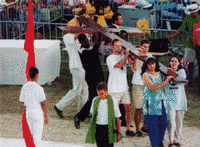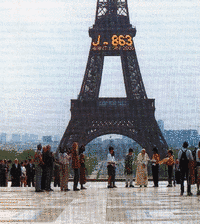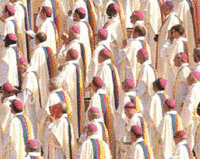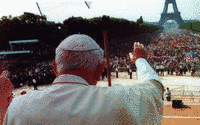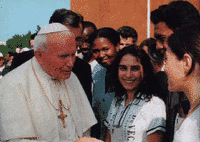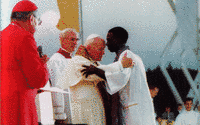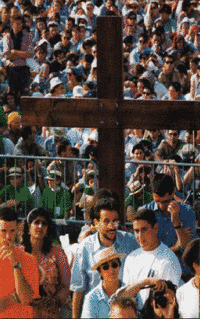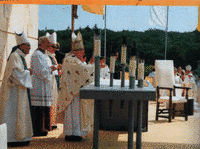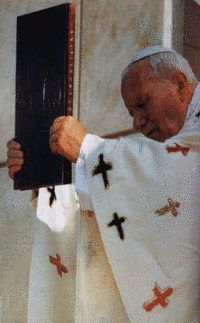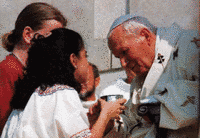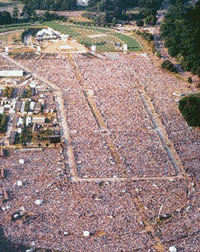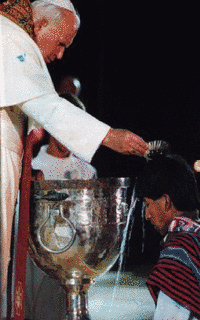World Youth Day Paris 1997
XII Journée Mondiale de la Jeunesse - in France
6th International WYD / JMJ - Paris, 21-24 August 1997
“Teacher, where are you staying? Come and see”
Theme for 12th WYD (Jn 1: 38-39) & JPII's XII Message to Young People
Blessed Pope John Paul II greeted young people from all around the world at the arrival ceremony on the Champ de Mars, where he also gave a meditation. Our Holy Father wrote a Message for the Prayer Vigil for Vocations that evening (21 August) and for the Way of the Cross on the Friday. On Saturday 23rd August JPII celebrated Mass for the Youth Forum at Saint-Étienne du Mont. The finale took place at Longchamp Racecourse that evening with a Baptismal Vigil & Mass for World Youth Day on Sunday morning, for which there were over 1 million people present.
- Flash is required!
Father Fabien Lambert, who's 36 & a priest of the Emmanuel Community from Belgium: "Little bit by little bit during these days at World Youth Day Paris I started to be struck by something. I saw that ‘how come all these people can be in this joy? And how come this old man, John Paul II, can attract so many young people? There is no one else in the world who has such a big influence like this.' And I thought maybe there is something more and maybe God really does exist. It was the beginning of a little openness in my heart." ♦
Pope John Paul II's Words at the Baptismal Vigil with Young People
at Longchamp Racecourse - in English, French, German, Italian, Portuguese & Spanish
"Dear Young People, Dear Friends,
1. I begin by greeting all of you who are gathered here, and I do so with the words of the Prophet Ezekiel: for these words contain a marvellous promise from God and express the joy of your presence. "I will take you from the nations . . . a new heart I will give you, and a new spirit I will put within you; and I will take out of your flesh the heart of stone and give you a heart of flesh. And I will put my spirit within you, and cause you to walk in my statues and be careful to observe my decrees . . . you shall be my people, and I will be your God" (Ez 36:24-28).
2. I greet the French Bishops who are hosting us, and the Bishops from so many parts of the world. I also extend cordial greetings to the eminent representatives of the other Christian confessions with whom we share the same Baptism, and who have wished to take part in this Youth Celebration.
On the eve of 24 August we cannot forget the sad Massacre of Saint Bartholomew's Day, an event of very obscure causes in the political and religious history of France. Christians did things which the Gospel condemns. If I speak of the past, it is because "acknowledging the weaknesses of the past is an act of honesty and courage which helps us to strengthen our faith, which alerts us to face today's temptations and challenges and prepares us to meet them" (Tertio Millennio Adveniente, 33). Therefore I willingly support the initiatives of the French Bishops for, with them, I am convinced that only forgiveness, offered and received, leads little by little to a fruitful dialogue, which will in turn ensure a fully Christian reconciliation. Belonging to different religious traditions must not constitute today a source of opposition and tension. Quite the contrary, our common love for Christ impels us to seek tirelessly the path of full unity.
3. The liturgical texts of our Vigil are, in part, the same as those used for the Easter Vigil. They speak of Baptism. The Gospel of Saint John recounts Christ's night-time conversation with Nicodemus. Having come in search of Christ, this member of the Sanhedrin declares his faith: "Rabbi, we know that you are a teacher come from God; for no one can do these signs that you do, unless God is with him" (Jn 3:2). Jesus answers him: "Truly, truly, I say to you, unless one is born anew, one cannot see the kingdom of God" (Jn 3:3). Nicodemus asks him: "How can a man be born when he is old? Can he enter a second time into his mother's womb and be born?" (Jn 3:4). Jesus replies: "Truly, truly, I say to you, unless one is born of water and the Spirit, one cannot enter the kingdom of God. That which is born of the flesh is flesh, and that which is born of the Spirit is spirit" (Jn 3:5-6).
Jesus makes Nicodemus pass from things visible to things invisible. Each one of us is born of man and woman, of a father and a mother; this birth is the point of departure of our whole existence. Nicodemus is thinking in terms of this natural event. On the other hand, Christ came into the world to reveal a different birth, the spiritual birth. When we profess our faith we proclaim who Christ is: "We believe in one Lord, Jesus Christ, the only Son of God, eternally begotten of the Father, God from God, light form light, true God from true God, begotten, not made, of one being with the Father (consubstantialis Patri). Through him all things were made (per quem omnia facta sunt). For us men and for our salvation he came down from heaven: by the power of the Holy Spirit he became incarnate from the Virgin Mary, and was made man (descendit de caelis et incarnatus est de Spiritu Sancto ex Maria virgine et homo facto est)". Yes, young friends, the Son of God became man for you, for each one of you!
4. "Unless one is born of water and the Spirit, one cannot enter the kingdom of God" (Jn 3:5). Thus, in order to enter the Kingdom, man must be born anew, not according to the flesh but according to the Spirit. Baptism is precisely the sacrament of this birth. The Apostle Paul gives a profound explanation of this in the passage from the Letter to the Romans which we have heard: "Do you not know that all of us who have been baptized into Christ Jesus were baptized into his death? We were buried therefore with him by baptism into death, so that as Christ was raised from the dead by the glory of the Father, we too might walk in newness of life" (Rm 6:3-4). The Apostle gives us here the meaning of this new birth; he shows why the sacrament of Baptism takes place by immersion into water. This is not a merely symbolic immersion into the life of God. Baptism is the concrete and effective sign of immersion into the death and resurrection of Christ. We understand, then, why tradition has linked Baptism to the Easter Vigil. It is on that day, and above all on that night, that the Church re-lives Christ's death, that the Church as a whole is caught up in the cataclysm of that death from which a new life will burst forth. Therefore, the Vigil, in the precise meaning of the word, is an act of waiting: the Church awaits the resurrection; she awaits the life which will be victorious over death and will lead man into life.
To every person who receives Baptism is given a participation in the resurrection of Christ. St Paul returns often to this theme which sums up the essence of the true meaning of Baptism. He writes: "If we have been united with him in a death like his, we shall certainly be united with him in a resurrection like his" (Rom 6:5). And also: "We know that our old self is crucified with him so that the sinful body might be destroyed, and we might no longer be enslaved to sin. For he who has died is freed from sin. But if we have died with Christ, we believe that we shall also live with him. For we know that Christ being raised from the dead will never die again; death no longer has dominion over him. The death he died he died to sin, once for all, but the life he lives he lives to God. So you also must consider yourselves dead to sin and alive to God in Christ Jesus" (Rom 6:6-11). With Paul, dear young people, you say to the world: our hope is steadfast; through Christ we live for God.
5. In recalling this evening the Easter Vigil, we are touching upon fundamental questions: life and death, mortality and immortality. In the history of humanity Jesus Christ has reversed the meaning of human existence. If everyday experience shows us this existence as a passage towards death, the paschal mystery opens to us the perspective of a new life beyond death. For this reason, the Church, which professes in the Credo the death and resurrection of Jesus, has every reason also to pronounce these words: "I believe in the resurrection of the dead and the life of the world to come".
6. Dear young people, do you know what the sacrament of Baptism does to you? God acknowledges you as his children and transforms your existence into a story of love with him. He conforms you to Christ so that you will be able to fulfil your personal vocation. He has come to make a pact with you and he offers you his peace. Live from now on as children of the light who know that they are reconciled by the Cross of the Saviour!
Baptism — "mystery and hope of the world to come" (St Cyril of Jerusalem, Procatechesis 10, 12) — is the most beautiful of God's gifts, inviting us to become disciples of the Lord. It brings us into intimacy with God, into the life of the Trinity, from this day forward and on into eternity. It is a grace given to the sinner, a grace which purifies us from sin and opens to us a new future. It is a bath which washes and regenerates. It is an anointing which conforms us to Christ, Priest, Prophet and King. It is an enlightenment which illumines our path and gives it full meaning. It is a vestment of strength and perfection. Dressed in white on the day of our Baptism, as we shall be on the last day, we are called to preserve every day its bright splendour and to discover it anew, through forgiveness, prayer and Christian living. Baptism is the sign that God has joined us on our journey, that he makes our existence more beautiful and that he transforms our history into a history of holiness.
You have been called, chosen by Christ to live in the freedom of the children of God; you have been confirmed in your baptismal vocation by the Holy Spirit who dwells in you, in order that you may proclaim the Gospel all your lives. In receiving Confirmation, you commit yourselves to using all your strength in order to make the gift which you have received grow step by step through the reception of the sacraments, particularly the Eucharist and Penance which sustain in us the life received at Baptism. As baptized individuals, you bear witness to Christ by your concern for a life that is upright and faithful to the Lord, maintained by means of a spiritual and moral struggle. Faith and moral behaviour are linked. In fact, the gift received leads us to a permanent conversion, so that we might imitate Christ and be worthy of the divine promise. The word of God transforms the lives of those who accept it, because it is the rule of faith and action. In their lives, in order to respect fundamental values, Christians also experience that suffering which can result from moral choices opposed to worldly behaviour and which therefore can be heroic. But this is the price of the life of blessed happiness with the Lord. Dear young people, this is the price of your witness. I count on your courage and fidelity.
7. It is in the midst of your brothers and sisters that you are to live as Christians. In Baptism God has given us a mother, the Church, with whom we grow spiritually in order that we may walk the path of holiness. This sacrament incorporates you as members of a people, it makes you sharers in the life of the Church and gives you brothers and sisters to love, in order that you might be "one in Christ" (Gal 3:28). In the Church, there are no longer any borders; we are one people standing together, made up of many groups with different cultures, attitudes and modes of behaviour, in communion with the Bishops, the pastors of the flock. This unity is a sign of richness and vitality. In diversity, your first concern must be for unity and fraternal cohesion, which will enable personal development to take place in a serene way and allow the whole body to grow.
Baptism and Confirmation, however, do not remove us from the world, for we share the joys and hopes of people today and we make our contribution to the human community, in the life of society and in every technical and scientific field. Thanks to Christ, we are close to all of our brothers and sisters, and we are called to show the profound joy which is found in living with him. The Lord calls us to undertake our mission right where we are, for "the place which God has assigned to us is so beautiful that we may never abandon it" (cf Epistle to Diognetus VI, 10). Whatever we do, our existence is for the Lord: that is our hope and our title to glory. In the Church, the presence of young people, catechumens and newly baptized is a great treasure and a source of vitality for the whole Christian community, called to account for its faith and to bear witness to that faith to the ends of the earth.
8. One day, at Capernaum, when many of the disciples left Jesus, Peter responded to Jesus' question: "Do you also wish to go away?", by saying: "Lord, to whom shall we go? You have the words of eternal life" (cf Jn 6:67,68). At this World Youth Day in Paris, one of the capitals of the modern world, the Successor of Peter comes to tell you once more that these words of the Apostle must be the beacon which enlightens you on your journey. "Lord, to whom shall we go? You have the words of eternal life" (Jn 6:68). More still: not only do you speak to us of eternal life, but you yourself are that life. Truly, you are "the way, and the truth, and the life" (Jn 14:6).
9. Dear young people, by your baptismal anointing you have become members of the holy people. By your anointing at Confirmation you share fully in the Church's mission. The Church, of which you are a part, has confidence in you and is counting on you. May your Christian lives be a progressive "getting used to" life with God, according to the beautiful expression of St Irenaeus, so that you may be missionaries of the Gospel!"
At the end of the Vigil, the Holy Father greeted the young pilgrims in different languages:
[In English] "To all the English-speaking young people who are in attendance at this evening Vigil I extend a special greeting. Remember that you are never alone, Christ is with you on your journey every day of your lives! He has called you and chosen you to live in the freedom of the children of God. Turn to him in prayer and in love. Ask him to grant you the courage and strength to live in this freedom always. Walk with him who is "the Way, the Truth and the Life"!
[In Spanish]: "Queridos jóvenes españoles y latinoamericanos: ¡Gustad la maravillosa experiencia de la vida en Dios, iniciada en el Bautismo y confirmada por el Espíritu! ¡Dad valiente testimonio de ello en vuestros ambientes y amad a los demás como Cristo nos enseñó!
[In German]: Cari giovani di lingua tedesca! Sono lieto che siate pronti a vegliare e a pregare con me oggi. La vostra missione di battezzati e di confermati consiste nel portare Cristo al mondo. Rimanete vigili per seguire gli sviluppi di questo tempo e risvegliate gli uomini affinché possano orientare la propria vita a Cristo.
[In Italian]: Carissimi giovani di lingua italiana! Rinati dall'acqua e dallo Spirito, voi siete innestati in Cristo per vivere una nuova vita. La Confermazione vi ha pienamente inseriti nella missione della Chiesa. Siate annunciatori instancabili del Vangelo, offrendone testimonianza nella vostra vita.
[In Polish]: Cari giovani concittadini, è con gioia che prendo parte con voi a questa veglia. Lo Spirito Santo ci ha riunito qui affinché, evocando la liturgia della vigilia pasquale, affrontiamo i problemi fondamentali di ogni uomo: la vita e la morte, la condizione mortale e l'immortalità. Crediamo che, nella storia dell'umanità, solo Cristo sia andato a fondo in queste domande. Attraverso la sua morte e la sua resurrezione, ha invertito il senso dell'esistenza umana. Il mistero pasquale apre la prospettiva di una vita nuova, al di là della morte. Ecco perché, nel ricordo del nostro battesimo, nostra immersione nella morte e nella resurrezione di Cristo, ci rivolgiamo a Lui con fiducia e proclamiamo: «Signore, da chi andremo? Tu hai parole di vita eterna» (Gv 6, 68). Possa questa vigorosa proclamazione divenire per ognuno e per ognuna di voi un programma di vita: non ne resterete delusi!
Queridos amigos, amanhã de manhã celebraremos juntos a Eucaristia. Os nossos amigos, os neobaptizados desta tarde, receberão pela primeira vez o Corpo e o Sangue de Cristo. Aproveitai esta linda noite para descansar; aproveitai- a também para rezar, sozinhos ou em grupo. Preparai assim o vosso coração para entrar amanhã na acção de graças de Jesus a seu Pai. Já podemos dar graças na alegria da oração, com o cântico da Virgem Maria, o «Magnificat».
Pope John Paul II's homily at Mass for World Youth Day Paris
at Longchamp Racecourse on Sunday 24th August 1997 - in English, French, German, Italian, Portuguese & Spanish
1. "1. "Teacher, where are you staying?" (Jn 1:38).
"This is the question which Jesus was asked one day by two young men. This happened on the banks of the Jordan. Jesus had gone there to receive the baptism of John. But the Baptist, when he saw Jesus coming towards him, said: "Behold, the Lamb of God" (Jn 1:36). These prophetic words indicated the Redeemer, the one who was to give his life for the salvation of the world. And so, even from the baptism in the Jordan, John designated the Crucified One. It was precisely the two disciples of John, upon hearing these words, followed Jesus: is this not full of significance? When Jesus asks them: "What do you seek?" (Jn 1:38), they answer him with a question of their own: "Rabbi" (which means Teacher), "where are you staying?" Jesus replies: "Come and see". "They came and saw where he was staying; and they stayed with him that day" (Jn 1:39). They became the first disciples of Jesus. One of them was Andrew, who also brought to Jesus his brother Simon Peter.
Dear friends, I am happy to be able to meditate upon this Gospel with you, together with the Cardinals and Bishops who have joined us. I am pleased to greet them, especially Cardinal Eduardo Pironio who has worked so hard for the World Youth Days. I am grateful to Cardinal Jean-Marie Lustiger for his welcome, to Bishop Michel Dubost and to the Bishops of France and those from many countries of the world who are accompanying you and who have guided your reflections. My cordial greeting also goes to the concelebrating priests, the men and women religious, and the leaders of your movements and diocesan groups.
I thank our brothers and sisters from other Christian communities, as well as the civil authorities, for their presence and for their participation in this liturgical celebration.
In greeting you all again, I wish in particular to express affection and encouragement to the handicapped among you; we are all grateful that you are with us and have brought your testimony of faith and hope.
In the name of you all, I would also like to express gratitude to the many volunteers who have worked so hard and so effectively in organizing this gathering.
2. The few lines of the Gospel of John which we have just heard sum up the programme of World Youth Day: it is an exchange of questions, and then an answer which is also an appeal. In presenting this encounter with Jesus, today's liturgy wants to show that which counts most in your lives. As the Successor of Peter, I too have come to invite you to ask Christ: "Where are you staying?" If you ask him this question sincerely, you will be able to hear his response and receive from him the courage and strength to carry it out.
The question is born of a quest. Man seeks God. The young person realizes in the depths of his being that this quest is the inner law of his life. Human beings seek their way in the visible world and, through the visible world, they seek the unseen world at every stage of their spiritual journey. Each of us can repeat the words of the Psalmist: "Your face, Lord, do I seek; hide not your face from me" (Ps 27:8-9). We all have our personal history and an innate desire to see God, a desire which makes itself felt at the same time as we discover the created world. This world is wonderful and rich; it sets before us countless treasures; it enchants us; it attracts both our reason and our will. But in the end it does not satisfy our spirit. Man realizes that this world, with all its many riches, is superficial and precarious; in a sense, it is destined for death. Nowadays, we are more aware of the fragility of our earth, too often degraded by the hand of man himself, to whom the Creator entrusted it.
As regards man himself, he comes into the world, is born from a mother's womb, grows and matures; he discovers his vocation and develops his personality during the course of years of activity; then the moment approaches when he must leave this world. The longer his life is, the more he realizes how precarious life is, and the more he ponders on the question of immortality: what exists beyond the frontiers of death? Then, from the depths of his being, there arises the question addressed to the One who has conquered death: "Rabbi, where are you staying?" Teacher, you who love and respect the human person, you who have shared in human suffering, you who illumine the mystery of human existence, help us to discover the true meaning of our life and vocation! "Your face, Lord, do I seek; hide not your face from me" (Ps 27:8-9).
3. On the banks of the Jordan, and much later still, the disciples failed to realize who Jesus truly was. It took them a long time to understand the mystery of the Son of God. We too have an innate desire to know the one who reveals the face of God. Christ answered the question of his disciples by way of his entire messianic mission. He taught and, in order to confirm the truth of what he proclaimed, he worked great miracles, healing the sick, raising the dead, calming the storms of the sea. But this whole extraordinary journey reached its fulfilment on Golgotha. It is by contemplating Christ on the Cross, with the eyes of faith, that we can "see" who the Saviour really is: the one who bore our sufferings, the just man who made his life a sacrifice and who would bring righteousness to many (cf Is 53:4,10-11).
Saint Paul sums up the highest wisdom in today's second reading with these striking words: "The word of the Cross is folly to those who are perishing, but to us who are being saved it is the power of God. For it is written: 'I will destroy the wisdom of the wise, and the cleverness of the clever I will thwart' . . . Since, in the wisdom of God, the world did not know God through wisdom, it pleased God through the folly of what we preach to save those who believe . . . We preach Christ crucified" (1 Cor 1:18-23). The Apostle was speaking to the people of his time, to the children of Israel who had received God's revelation on Mount Sinai and to the Greeks who had developed an impressive human wisdom, a great philosophy. But now, the unsurpassable culmination of wisdom is the crucified Christ, not only because of his words, but because he delivered himself up for the salvation of humanity.
With his remarkable fervour, St Paul repeats: "We preach Christ Crucified". He whom the world considered as nothing but weakness and folly is the one whom we proclaim to be Power and Wisdom, the fulness of Truth. It is true that our confidence has its highs and lows. Certainly our vision of faith is often darkened by doubt and by our own weakness. Humble and poor sinners that we are, let us accept the message of the Cross. In order to answer our question: "Rabbi, where are you staying?", Christ summons us: come and see; in the Cross you will see the radiant sign of the world's redemption, the loving presence of the living God. Because Christians realize that the Cross dominates history, they place the crucifix in their churches and along roadsides, or they wear it near their hearts. For the Cross is a genuine sign of the presence of the Son of God; by this sign he is revealed as the Redeemer of the world.
4. "Rabbi, where are you staying?" Each day the Church responds: Christ is present in the Eucharist, in the sacrament of his death and resurrection. In and through the Eucharist, you acknowledge the dwelling-place of the living God in human history. For the Eucharist is the sacrament of the love which conquers death; it is the sacrament of the Covenant, pure gift of love for the reconciliation of all humanity. It is the gift of the real presence of Jesus the Redeemer, in the bread which is his body given up for us, in the wine which is his blood poured out for all. Thanks to the Eucharist, constantly renewed among all the peoples of the world, Christ continues to build his Church: he brings us together in praise and thanksgiving for salvation, in the communion which only infinite love can forge. Our worldwide gathering now takes on its fullest meaning, through the celebration of Mass. Dear young friends, may your presence here mean a true commitment in faith! For Christ is now answering your own question and the questions of all those who seek the living God. He answers by offering an invitation: this is my Body, take it and eat. To the Father he entrusts his supreme desire: that all those whom he loves may be one in the same communion.
5. The response to the question "Teacher, where do you live?" involves many aspects. It has an historical, paschal and sacramental dimension. Today's first reading suggests yet another aspect of the answer to the question which is the theme of the World Youth Day: Christ dwells among his People. This is the people mentioned in the Book of Deuteronomy in relation to the history of Israel: "It is because the Lord loves you . . . that [he] has brought you out with a mighty hand and redeemed you from the house of bondage . . . Know therefore that the Lord your God is God, the faithful God who keeps his covenant . . . to a thousand generations" (Dt 7:8-9). Israel is the people whom God chose for himself and with whom he made a covenant.
In the New Covenant, God's election has been extended to all the peoples of the earth. In Jesus Christ, God has chosen all humanity for his own. Through the Redemption he has revealed the universality of his election. In Christ, there is no longer Jew or Greek, nor slave or free; all are now one (cf Gal 3:28). Everyone is called to share in God's life, thanks to the death and resurrection of Christ. Does not our encounter at this World Youth Day reflect this truth? All of you, assembled here from many countries and continents, bear witness to the universal vocation of the People of God redeemed by Christ! The ultimate answer to the question "Teacher, where are you staying?" should then be understood as: I live in all the human beings who have been saved.
Yes, Christ dwells in his People, the People which has struck root among all the peoples of the earth, the People which follows him, the crucified and risen Lord, the Redeemer of the world, the Teacher who has the words of everlasting life, the one who is "the Head of the new and universal People of the children of God" (Lumen Gentium, 13).
The Second Vatican Council has said it wonderfully: "Christ has shared with us his Spirit who, being one and the same being in head and members, gives life to, unifies and moves the whole body" (LG, 7). Thanks to the Church which gives us a share in the very life of the Lord, all of us can now repeat Peter's words to Jesus: "To whom shall we go? To whom else shall we go? (cf Jn 6:68).
6. Dear young people, your pathway does not end here. Time does not stop today. Go forth now along the roads of the world, along the roads of humanity, staying united in the Church of Christ!
Continue to contemplate the glory of God, the love of God; and you will be enlightened to build the civilization of love, to help man to see the world transfigured by wisdom and eternal love.
Forgiven and reconciled, be faithful to your Baptism! Be witnesses to the Gospel! As active and responsible members of the Church, be witnesses of Christ who reveals the Father, stay in the unity of the Spirit who is the giver of life!"
Pope John Paul II's words at the Angelus at the 12th WYD
at Longchamp Racecourse on Sunday 24th August 1997 - in English, French, German, Italian, Portuguese & Spanish
1. At the close of this World Youth Day in France, I wish to recall the great figure of Saint Theresa of Lisieux, whose birth took place 100 years ago.
This young Carmelite was entirely captivated by the love of God. She lived the radical offering of herself in response to that love. In the simplicity of daily life she also knew how to practise fraternal love. Imitating Jesus, she willingly sat at the table of sinners, her brothers and sisters, so that they might be purified by love, for she was animated by an ardent desire to see everyone "enlightened by the luminous torch of faith" (cf Ms C, 6 rº).
Theresa knew suffering in the body and trial in faith. But she remained faithful because, in her great spiritual intelligence, she knew that God is just and merciful; she understood that love is received from God rather than given by man. In the depths of darkness, she placed her hope in Jesus, the suffering Servant who offered his life for many (cf Is 53:12).
2. Theresa was never without the Book of the Gospels (cf Letter 193). She penetrated its message with an extraordinary certainty of judgement. She understood that in the life of God, Father, Son and Spirit, "mercy and truth meet" (Ps 85:10). In a few years, she ran "a giant's course" (Ms A, 44 vº). She discovered that her vocation was to be love itself in the heart of the Church. Theresa, humble and poor, shows the "little way" of the children who abandon themselves to the Father with "bold trust". The centre of her message, her spiritual attitude, is offered to all the faithful.
Theresa's teaching, a true science of love, is the luminous expression of her knowledge of the mystery of Christ and of her personal experience of grace; she helps the men and women of today, and she will help those of tomorrow, better to perceive the gifts of God and to spread the Good News of his infinite love.
3. Carmelite and apostle, teacher of spiritual wisdom for numerous persons, consecrated or laic, patroness of the missions, St Theresa has a privileged place in the Church. Her eminent teaching merits being considered among the most fruitful.
In response to numerous requests and after attentive study, I have the joy to announce that, on Mission Sunday, 19 October 1997, in St Peter's Basilica in Rome, I will proclaim Saint Theresa of the Child Jesus and the Holy Face, Doctor of the Church.
I wanted to give the solemn announcement here, because the message of St Theresa, a holy young woman so present in our times, is particularly suited to you young people: at the school of the Gospel she opens to you the path of Christian maturity; she calls you to an infinite generosity; she invites you to be in the heart of the Church disciples and ardent witnesses of the charity of Christ.
Let us invoke St Theresa so that she will lead the men and women of our times on the path of Truth and Life!
With Theresa, let us turn to the Virgin Mary, whom she honoured and to whom she prayed with filial confidence throughout her life.
Angelus Domini . . .
Blessed John Paul II's reflections on WYD / JMJ Paris in his General Audience
27 August 1997- in English, French, Italian, Portuguese & Spanish
"Dearest Brothers and Sisters,
1. With great joy I was able to take part in the 12th World Youth Day in Paris a few days ago. I am deeply grateful to the Lord who granted me this extraordinary experience of faith and hope.
I willingly express my gratitude to the President of the French Republic and to all the authorities for the kind welcome they gave me. I likewise thank all those who at various levels effectively contributed to the orderly and peaceful course of the whole event.
My gratitude is extended with fraternal warmth to Cardinal Jean-Marie Lustiger, Archbishop of Paris, to Archbishop Michel Dubost, President of the Organizing Committee, and to the entire French Bishops’ Conference for the great care with which the various phases of the world meeting were prepared and executed. Lastly, I address a cordial thought to all the volunteers, as well as to the families who with their generous hospitality enabled so many people to take part in such an important ecclesial event.
2. The 12th World Youth Day saw the gathering, far beyond all expectation, of young people from about 160 countries across the world. They met in the French capital to express the joy of their faith in Christ and to experience the beauty of being together as members of the one Church of Christ. On their arrival in France they encountered the generous hospitability of their French peers, who gave them a fraternal and cordial welcome, first throughout the country, then in the Île-de-France.
It was a particularly happy opportunity for them to discover the cultural and spiritual patrimony of France, whose place in the Church’s history is well known. Thus they could meet a living Church and a dynamic and open society.
The memory of the wonderful liturgies that marked the most significant moments of the "Triduum", culminating in the solemn celebration on Sunday, 24 August, will certainly remain impressed on everyone’s mind. Whether in the evocative setting of Notre-Dame, where the beatification of Frédéric Ozanam took place, or in the cathedral of lights created at Longchamp for the baptismal vigil, the rites were carried out in a religious atmosphere of intense devotion, aided by the music and songs inspired by different cultures and performed in the appropriate style.
3. The central theme, which guided their reflection during the various stages of the meeting, was the question the two disciples asked Jesus one day: "Teacher, where are you staying?", receiving the answer: "Come and see" (Jn 1:38). With these words, the Lord invited them to enter into a direct relationship with him in order to share his journey ("come") and to know him deeply ("see").
The message was clear: to understand Christ it is not enough to listen to his teaching: we must share his life and somehow experience his living presence. Therefore the World Youth Day theme fitted into the preparation for the Great Jubilee of the Year 2000, which is meant to represent to contemporary man Jesus Christ, the one Saviour of the world, yesterday, today and for ever.
This World Youth Day intended to offer the answer to young people, who are seeking the ultimate meaning of their life: the discovery of Christ, the Word made flesh for man’s salvation, in addition to shedding light on the human mystery beyond death, makes it possible in time to build a society where human dignity is respected and brotherhood is real.
4. The recurring theme that inspired their reflection and prayer and linked the great meetings was the reference to the Church’s celebration of the paschal mystery in the Sacred Triduum.
My first meeting with the young people took place in the grandiose setting of the Champ-de-Mars, dominated by the massive structure of the Eiffel Tower: we listened again to the great lesson of service to our neighbour, which Jesus offered with the washing of the feet. At the various evening vigils the young people were invited to mediate on the sacrament of the Eucharist, the inexhaustible source of all genuine love.
Richly significant in this context was the beatification of Frédéric Ozanam, apostle of charity and founder of the St Vincent de Paul Conferences, as well as the distinguished figure of a profound Catholic intellectual. The topic on love was further developed in the "Via Crucis" on Friday, in which attention was focused on the supreme gift which Christ the Servant made of himself for the world’s salvation.
The baptismal vigil on Saturday, which took place at the Longchamp Racecourse, made it possible to pause and reflect on the Christian's new birth and on his call to live a relationship of personal communion with the Redeemer.
Lastly, on Sunday the 24th, the great Eucharistic celebration took place, during which we returned to the central theme: it is necessary to go to Christ ("come"), to discover ever more deeply his true identity ("see"). In him, the believer, through the "folly" of the Cross, reaches the supreme wisdom of love, and, round the Eucharistic table, discovers the profound unity that makes persons from every corner of the earth a single Mystical Body.
The spectacle offered by the young people on the immense esplanade of Longchamp was an eloquent confirmation of this truth: despite the diversity of language, culture, nationality and skin colour, young men and women from the five continents shook one another’s hand, exchanged smiles and greetings, and prayed and sang together. It was obvious that they felt at home as members of one great family. To a world fraught with divisions of every kind, frozen in mutual indifference, exposed to the anguish of global alienation, the young people proclaimed a message from Paris: faith in the crucified and risen Christ can establish a new brotherhood in which we accept one another because we love one another.
5. During the Angelus prayer at the end of the great concelebration, I had the joy of announcing that St Theresa of Lisieux would soon be proclaimed a doctor of the Church. Young herself, like the participants in the World Day, Theresa had a marvellous understanding of the overwhelming message of God’s love, received as a gift and lived with the humble trust and simplicity of children who in Jesus Christ totally entrust themselves to the Father. And she has become its authoritative teacher for the present and future of the Church.
What we experienced together in Paris in the past few days was an extraordinary event of hope, a hope that re-echoed in the world from the hearts of young people. Let us pray that the zeal of these many young men and women from the four corners of the earth may continue to bear abundant fruit in the ever-young Church of the new millennium."

